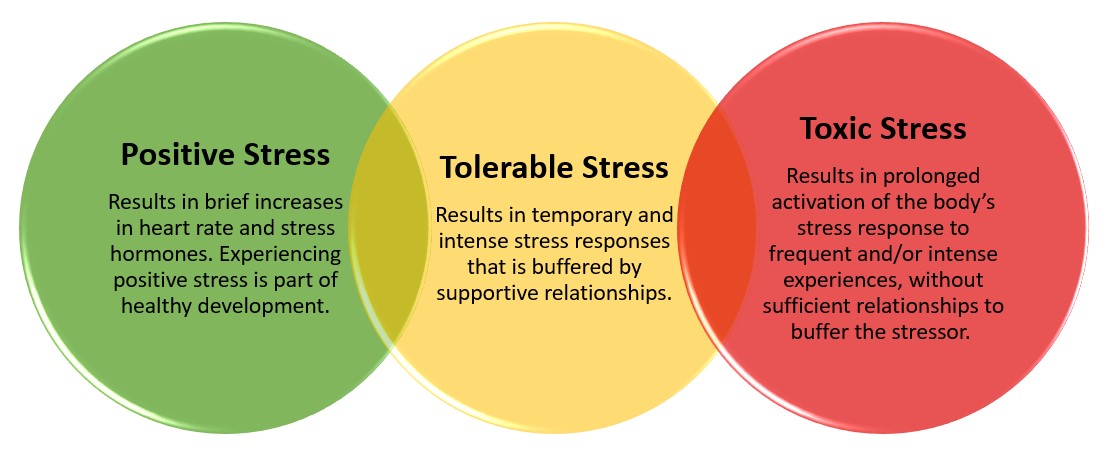Adverse Childhood Experiences (ACE) in Minnesota
Contact Info
ACEs, Trauma, and Stress
Learning how to manage stress and regulate stress responses is critical to a child’s development.
Stress in reasonable doses promotes growth and brain development throughout childhood. Stress is a normal part of daily life, not all stress is bad. The three types of stress are: positive, tolerable, and toxic. Acute or prolonged stress can become toxic to the developing brain and body. ACEs can cause toxic stress.

Positive stress can be experienced during common situations that result in brief increased heart rate or intensified focus. Examples of positive stress may be learning something new, the first day of school, or playing a competitive game.
Tolerable stress includes more serious, temporary stressors that activate the body’s stress systems for longer periods of time. Supportive relationships with peers and adults along with other key protective factors make situations tolerable for some and not others. Examples of tolerable stress are when a loved one passes away, breaking a bone, or when parents get divorced.
Toxic stress is the most serious kind of stress. Toxic stress results in long-term activation of the body’s stress response systems in the face of strong (acute), frequent, or prolonged adversity without enough supportive relationships or protective factors to help reduce the stress. Toxic stress can disrupt the brain’s functioning and immune systems, both of which make coping much harder. Examples of toxic stress include experiencing abuse and violence at home or in the community. Children’s stress response systems are immature at birth and therefore vulnerable to abuse and neglect. If the adults in a child’s life are not able to buffer the stress or are themselves the source of the stress, the child may begin to experience the world as dangerous and uncertain. In the face of danger, the body reacts by producing excess surges in stress hormones, such as cortisol. In childhood, persistent and intense stress stemming from ACEs influences how the brain develops. Toxic stress strengthens connections in the parts of the brain that are associated with fear, arousal, and emotional regulation. When developing brains experience continuous toxic stress, children may experience the following:
- Getting sick more often as a result of a weakened immune system.
- Struggling with learning, attention span, and memory. Being on high-alert all the time and quick to engage in their fight, flight, or freeze response when they feel in danger.
- Feeling distrustful of adults.
- Difficulties making friends.
A person’s reaction to ACEs depends on the person’s own biological stress reactions, their protective characteristics, the intensity and duration of the ACE, and the presence of a stable, responsive, and nurturing caregivers and community. Throughout our childhood, but particularly from infancy through preschool, children depend on sensitive, responsive caregivers to help maintain the normal daily rhythm of the stress hormone, cortisol. Protective factors in the community that can decrease the negative effect of ACEs may include access to medical care and mental health services, engaging after school programs and activities, family friendly work policies, and programs that provide economic and financial help.
Experiencing ACEs and toxic stress does not mean that children will experience health challenges. There are lots of different ways that parents, family members, and other adults can reduce the impact of toxic stress on children through growing resilience and protective factors. Preventing ACEs Resources are available.